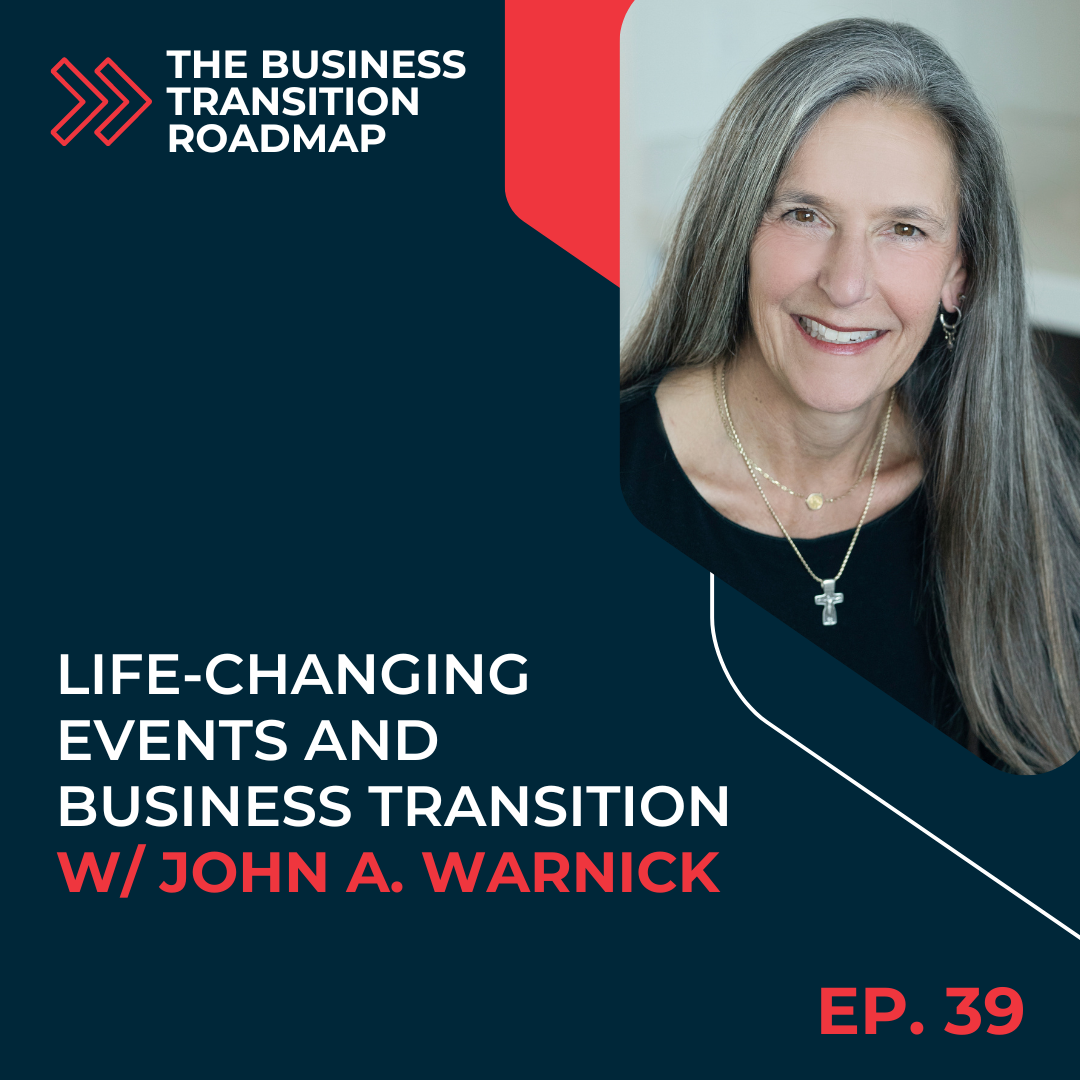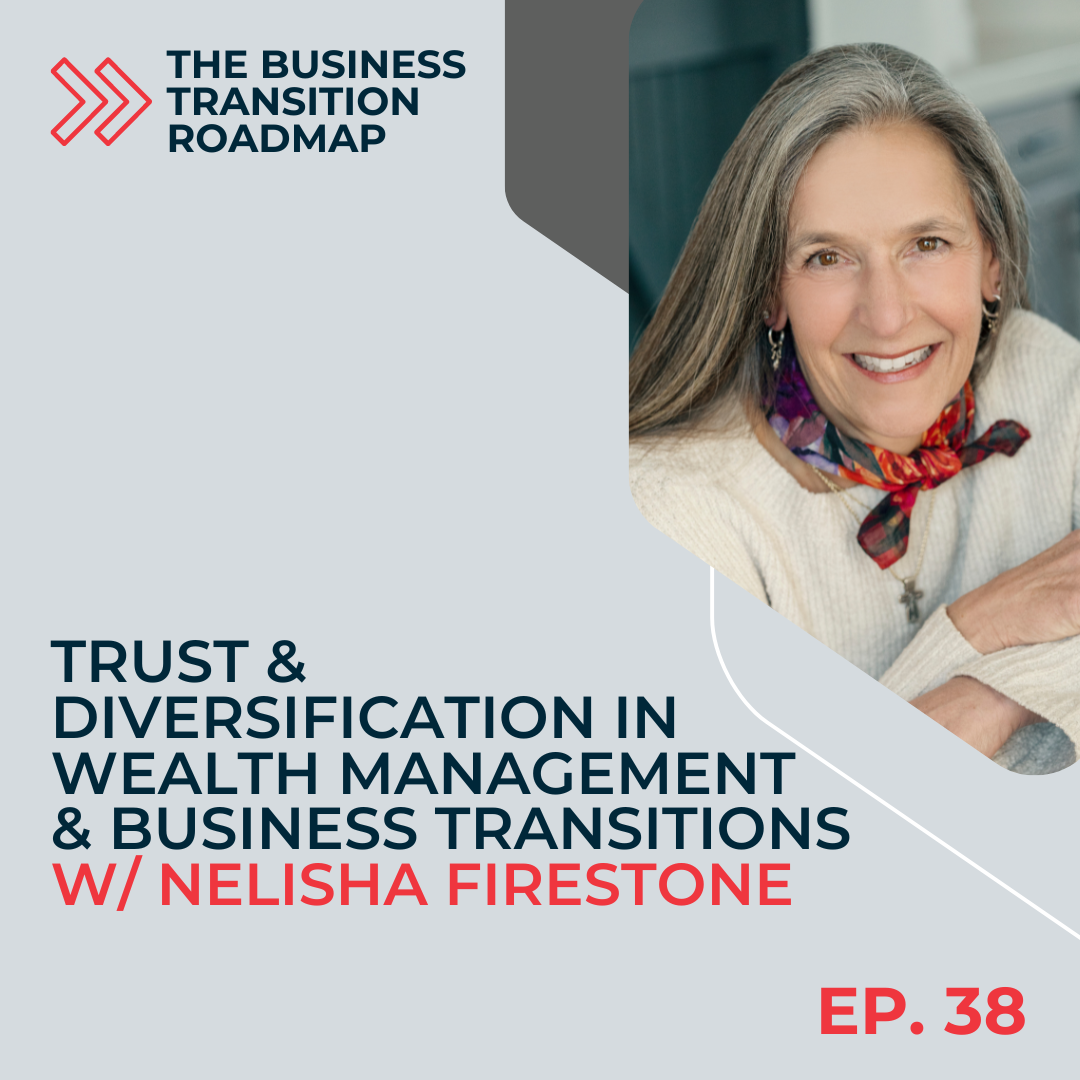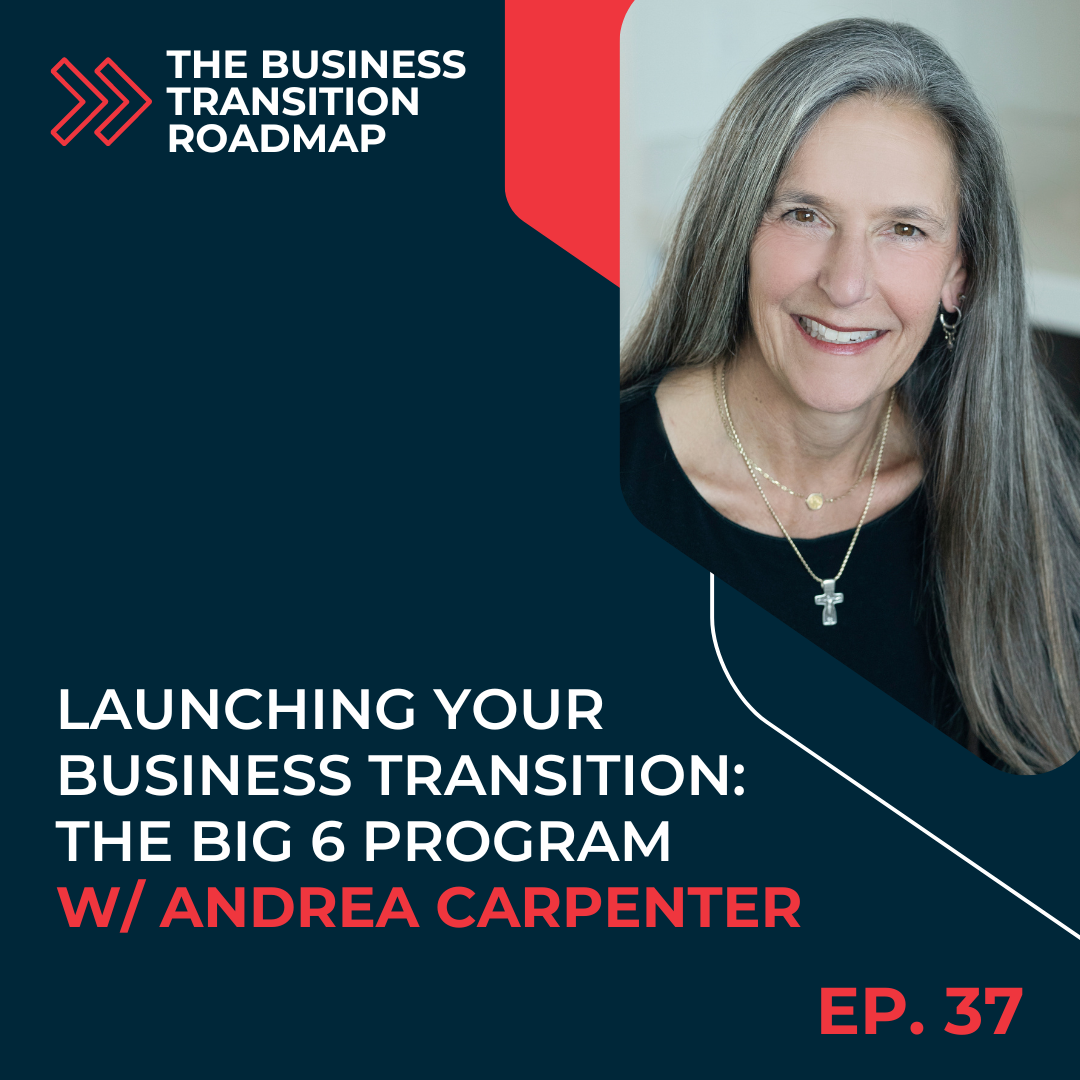Episode Description:
When a successor comes into the picture for a business transition, people are always questioning whether they will succeed. Will they have the skills? Will they have the knowledge? While those things are important, they are skills that can be learned with time. The real question of whether a successor will thrive lies a little deeper: how they operate, how they behave, and how they approach challenges and failure in a business. Tap or click the play button below to listen to: The 5 qualities you should look for in a successor.
In this episode, Elizabeth shares the five main characteristics you should be looking for in a successor to maintain the health, well-being, and overall success of your business in the long term. You’ll learn that it’s not just their skills and knowledge in the company, but who they are as a person and a professional that will shape the future of your business.
Connect with Elizabeth and the Transition Strategists:
Website: https://transitionstrategists.com/
Facebook: https://www.facebook.com/thetransitionstrategists
LinkedIn: https://www.linkedin.com/company/transitionstrategists/
This episode was produced by Story On Media & Marketing: https://www.successwithstories.com.
The 5 Qualities You Should Look For In a Successor Transcript
[00:00:00] Elizabeth Ledoux: Hi, and welcome back. Um, today what we’re gonna talk about is five main characteristics that when you look for your successor, you’re gonna be wanting to look for these five main characteristics. They’re very important to the long-term health and wellbeing of the business, and also to the success of your successor.
[00:00:22] That’s kind of a mouthful there. So people always question. They’re the successor. Will they be able to do it? Will they have the skills? Will they have the knowledge? Will they have all of those things? And those things to me are more tactical. Those are just skill oriented. What we’re gonna talk about today and do a little bit deeper dive in, I is in the characteristics, um, what are you looking for in how they operate and how they behave and how they approach.
[00:00:55] Business, how they approach, um, failure, how they approach, challenge, how they approach success and excitement. So those are all things, their behavior makes up how they’re gonna be and what that culture’s gonna be like in your business. And so we want somebody who’s really gonna be a great fit, and these characteristics help you to get that.
[00:01:22] so many times. What an owner will do is they surround themselves with people who are implementers. So they’re people who like to operate things, they like to hold things in place. Um, , sometimes they’re not excited or not very excited about change. They truly are, would be implementers, what I would call implementers, people who refine things and make things a little bit better.
[00:01:52] People who run systems and processes and hold things in place. And that makes the business usually, um, more profitable. It makes it successful. It helps to add cash flow and it helps to. Add to the longevity of the success of the business. So those are all good things, and we need those people. When you’re looking for your next successor, typically what you’re looking for is somebody who’s a little bit more entrepreneurial and maybe a little bit of a visionary.
[00:02:26] And if you reflect on yourself, uh, you can ask yourself, Hey, am I a visionary? Am I entrepreneurial? Entrepreneurs, you know, tend to think of themselves not that way. They’re only about 5% of our population. Only about 5% of them actually have or would be considered entrepreneurial. So with those entrepreneurial characteristics, so it’s not everybody that can step into this role of being the business owner and move this business forward successfully.
[00:02:58] Really need that preneur, those entrepreneurial characteristics and little bit of. To go with it. So you’re trying to replace yourself and that includes that long-term outlook and what the business will be in the future. So one thing you wanna do is look at where the business is as well. So you’re looking at your team, you’re looking at yourself, um, looking at how you operate and what role you play.
[00:03:32] and how you move this business forward. As the entrepreneur owner, I also wanna look at the business and where it is, uh, the business. Depending on if it’s in the beginning, if it’s a young business, you’re gonna need somebody who’s more a creator, somebody who. , um, really is maybe risk adverse a little bit more so than others because they’re gonna be needing to take the risks to get this thing to build and grow.
[00:04:00] If it’s a stabilized business, you might be looking for someone who, um, can run and operate it for a while that has some characteristics of risk. So they hold some things in place and they also then are gonna move it forward and create forward. if you’re in a cycle where the business needs to be reinvented, which at times is the case.
[00:04:24] Um, I told a story in a prior podcast about a father-daughter. This is a different father-daughter that we worked with, um, out of Canada. Uh, very interesting situation. The. , we have a, a tool that we use to get people’s perception of how they see the business. And in this particular case, um, you know, looking at the exact same picture, we’re looking at the exact same picture, exact same business.
[00:04:54] And the results of our survey came out, it’s called the entrepreneurial flight survey. And, um, the results came out that the daughter saw the business as not being very well develop. So she saw it down in the lower part of what we call this entrepreneurial flight, where it had a lot of reinventing to do and had a lot of opportunity in front of it where the father perceived the exact same business as being higher in this entrepreneurial flight, so higher in the entrepreneurial flight.
[00:05:27] So it was, um, very well established, running extremely well. Human resources were in place, everything was. I was kind of done in his mind. The reason why that’s important is because when you look at the business and you’re selecting this next entrepreneur or this next successor to come in and help you to build and grow and run it and take it forward without you, you need to actually see the business.
[00:05:59] in a way that is more realistic. So an outside perspective is always helpful. Uh, you can get that from any advisor, CPAs, um, attorneys, different people that you might work with. They could give you a little bit of that perspective in where you’re going. And a lot of times people will bring in advisory boards to do that.
[00:06:21] So you’re looking at what successor do we. need to run and operate the business first and foremost. And then what successor characteristics do we need to continue to help it grow? And the cycle that the business is in is very important when you’re taking a look at that. So the successor characteristics, these are just my top five, so the ability to recognize opportunities.
[00:06:53] I don’t know if you’ve ever been in business with somebody who really, you would look out into the world because the opportunities exist in the world. If you’re familiar with a SWAT analysis, strengths, weaknesses, opportunities and threats. It’s opportunities and threats that are outside of the business.
[00:07:13] The strengths and weaknesses are internal to the business, and you affect those. The opportunities and threads are external to the business, so, if, uh, if your next successor cannot see the opportunity or the business can move right into it. And we have a model that we use that, um, Is, it kind of looks like a rocket.
[00:07:37] We call it the, the, um, enterprise and, um, kind of a play there, but we call it the enterprise and it looks kinda like a rocket. And you can imagine this business continues to move through space, move through time, move through, you know, The atmosphere, and as it does that, it should be able to fly into some opportunities and also avoid some threats.
[00:08:01] So avoid where those might be and fly into the opportunities. Being able to see that and being able to realize what those are. That’s crucial to the health and wellbeing of the company long term. So that’s number one. Um, the next one is to the tendency to seek out new opportunities if they’re not interested in new opportunity and new change and the morphing that the business needs to go through in order to get there.
[00:08:31] Right? That interest in seeking out novel and new things. , the business has a higher likelihood of staying the way it is, and we all know that that environment continues to change around the business, and the business has to be able to move and adapt and shift in order to meet all of those opportunities that are out there.
[00:08:55] So we need somebody who has this kind of tendency to go, Ooh, I think I’d like to go do that. Instead of, oh my gosh, I don’t wanna do that, but I have to. . Yeah. Not a good thing. Third one is self-sufficiency. Uh, get up in the morning. Wanna go to work? Can’t wait to get in there and to be self-sufficient. And you know, if you fall down, you’re gonna get up.
[00:09:23] And not only if you fall down, you’re gonna get up, but you’re gonna get your whole team up too. So this, this idea of lessons and self-sufficiency and helping, they want, that has to be a characteristic of theirs. It’s hard to teach self-sufficiency. Um, very difficult. I don’t even know if it can be done.
[00:09:44] Fourth one. High tolerance for uncertainty when you are this owner leader. I don’t know how many times in my business I’ve gone home and gone, oh my gosh, I don’t know. I don’t know what’s gonna happen tomorrow. I don’t know if we’re gonna get this deal. I don’t know if we’re gonna get all of our collections.
[00:10:07] I don’t know what the government’s going to do with regulations. I don’t know. Somebody who doesn’t have a high tolerance for uncertainty, it’s gonna be very difficult for them to operate as this new owner because again, they have to be the leader. Bring along the team and make sure that not only are they okay, but so is the whole business and the team behind them.
[00:10:34] The last one is the fifth one. Lack of fear of failure. Lack of fear of failure.
[00:10:43] it’s pretty hard to not fear failure. Big failure, um, that’s kind of out there. I’ve done a lot of work on anxiety, and anxiety is actually a really good thing for us. We wouldn’t be surviving as individuals without it. It’s just at what level can you handle that anxi anxiety. So lack of fear. Fear of failure, says, , I’m not afraid I’m gonna go out there.
[00:11:12] I’m gonna see what happens. I’m gonna make it happen, and I’ve got confidence, enough confidence in myself, going back to the self-sufficiency that if I fall down, I’ll find the next opportunity, get up and keep on going. So a lack of fear of failure, which again, Some of that is inherited, some of that is genetic.
[00:11:36] Some of it comes from your parents and how you were brought up and the lessons you learned from some of your mentors. But some of it, uh, comes from the way you’re built. So the big idea here is, that there are five big characteristics that are important when you’re thinking about your successor. So instead of thinking about the longevity or if they’ve shown up to work every day, or how loyal they’ve been to you, or how much they’ve helped you, Um, you start to have some different characteristics to evaluate people, and then you can match this up with their skills and with their knowledge and with other things.
[00:12:22] And what I’ve found though, is many owners don’t think about these characteristics. They miss ’em, and they hire only on skill and whether they like the person or not. So what I’d like for you to do is think about. . As we conclude this session, think about what characteristics do you think your business needs in order to move forward?
[00:12:47] Where’s your business in the business cycle? Um, what characteristics for this next entrepreneur, this next owner, would be really, really valuable for them to have to carry the business forward without you? So until next time, take care and I’ll look forward. Maybe someday hearing about what you’re pondering.
The Business Transition Roadmap with Elizabeth Ledoux
How do communities thrive? When businesses experience healthy growth and transition. Join CEO of The Transition Strategists, Elizabeth Ledoux as she and her guests identify what makes a successful business transition roadmap. If you know you want to transition or exit your business “one day”, today is the right day to start planning. This show will give you the roadmap.




